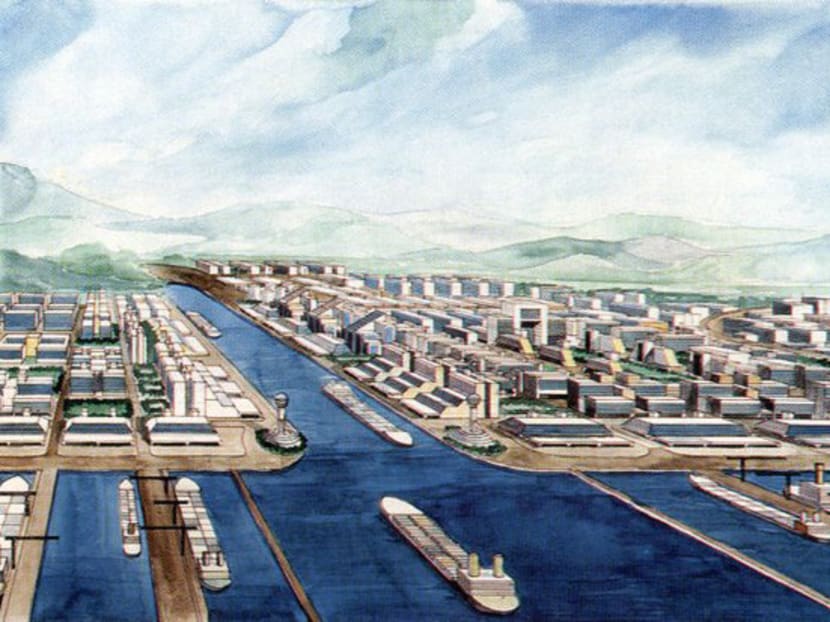Community leaders back study to revive Thai canal project
BANGKOK — A long-forgotten canal project linking the Gulf of Thailand with the Andaman Sea has been resurrected after an economic feasibility study was supported by a group of influential figures and businessmen with Chinese ties.

An artist's vision of the Kra Canal, surrounded by a thriving city and the beauty of the mountains of southern Thailand. Source: Bangkok Post
BANGKOK — A long-forgotten canal project linking the Gulf of Thailand with the Andaman Sea has been resurrected after an economic feasibility study was supported by a group of influential figures and businessmen with Chinese ties.
Many of them attended the recent International Conference on the Thai Canal in Bangkok to show their support for the Kra Canal project, now known as the “Thai Canal”.
The idea to build an Asian equivalent of a Suez Canal to bypass the crowded Straits of Malacca has been floated many times in past decades without going anywhere.
The attendees who backed the latest study included academics from the King Mongkut’s Institute of Technology Ladkrabang and the secretary-general to the General Prem Tinsulanonda Statesman’s Foundation.
According to the Kra Canal Study Team, one of the most viable routes for the canal would run from Nakhon Si Thammarat, which faces the Gulf of Thailand, through Phatthalung, Trang, and then Krabi onto the Andaman Sea.
EARLIER ANALYSIS: KRA CANAL ‘UNLIKELY’
This route is known as “9A”, said Mr Pakdee Tanapura, vice-president of the Economic Board of the Thai-Chinese Culture and Economy Association, and head of the study team.
The Thai Canal Association has a “strong intention” to push for the tangible feasibility study regardless of which government is in power, General Pongthep Tesprateep told the Bangkok Post.
The former secretary-general to ex-premier General Surayud Chulanont now chairs the association.
“If this government considers itself a caretaker government that is disinclined to commit to such a mega-project, we should still push for the feasibility study now because it is long overdue,” Gen Pongthep said.
Saying that he wanted to build momentum from the ground, Gen Pongthep said he had already received a positive response from the people in the South and those who live along the 9A route.
He added the association has already gathered over 200,000 signatures from academics, associations and citizens in the affected areas who want to see the canal built.
Mr Chuan Phukaoluan, chief adviser to the governor of Krabi, is also endorsing the project. So is Mr Phong Leng-ei, former director-general of the Royal Forest Department. They said it will bring prosperity to an area battered by low rubber prices.
“The South can no longer rely on agricultural products like rubber to prop up its economy. Prices are too low and they fluctuate a lot,” Mr Chuan said.
He said the canal, along with the prospect of having a new economic zone, should help raise educational levels and create more jobs in the South. He said the canal will trigger the development of higher education in engineering and vocational training, especially in Krabi and Phuket, to support the construction and maintenance of the canal.
Nonetheless, he said a study must be done to see what impact it will have to ensure development proceeds in a balanced way, without damaging the environment or the flourishing tourism industry there. Mr Phong said Thailand can no longer rely on exports and the Thai canal will generate enormous income for the people. He drew comparisons with port cities like Hong Kong and Singapore.
“Why do we have to send our best products to buyers outside our country when we can just sit here and collect the toll at home?” he said.
“This is a big project and we really have to think big. Questions regarding who will benefit or lose out are minor issues that can easily be resolved if we have a tangible feasibility study with a credible environmental impact assessment,” he said.
“We are willing to (move) because the canal will create jobs and help combat climate change,” said Mr Yongyut Kaewhhew of a village that would be affected in Nakhon Si Thammarat. He added that no non-government organisations opposed the project. BANGKOK POST






